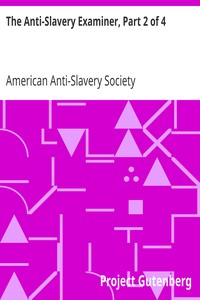The Anti-Slavery Examiner, Part 2 of 4 by American Anti-Slavery Society
"The Anti-Slavery Examiner, Part 2 of 4" by the American Anti-Slavery Society is a historical account written in the mid-19th century. This work serves as an examination of the institution of slavery, discussing its moral, legal, and political implications, while providing arguments against its justification, particularly in the context of American governance and legislation. The opening of the text focuses on the constitutional power of Congress over the District of Columbia, arguing
for the capacity of legislative authority to abolish slavery within this jurisdiction. The text asserts that the essence of a civilized government is rooted in the law and moral principles, which restrict the power of legislation. It emphasizes that Congress holds "exclusive legislation, in all cases whatsoever," meaning it can legislate on moral grounds, including the abolition of slavery. The portion then elaborates on historical precedents and societal views that support the notion that legislatures can enact laws that emancipate slaves, arguing that the continuation of slavery contradicts the ideals of justice and humanity inherent in the founding principles of American governance. (This is an automatically generated summary.)
Read or download for free
| How to read | Url | Size | |||
|---|---|---|---|---|---|
| Read now! | https://www.gutenberg.org/ebooks/11272.html.images | 2.0 MB | |||
| EPUB3 (E-readers incl. Send-to-Kindle) | https://www.gutenberg.org/ebooks/11272.epub3.images | 798 kB | |||
| EPUB (older E-readers) | https://www.gutenberg.org/ebooks/11272.epub.images | 826 kB | |||
| EPUB (no images, older E-readers) | https://www.gutenberg.org/ebooks/11272.epub.noimages | 801 kB | |||
| Kindle | https://www.gutenberg.org/ebooks/11272.kf8.images | 1.4 MB | |||
| older Kindles | https://www.gutenberg.org/ebooks/11272.kindle.images | 1.3 MB | |||
| Plain Text UTF-8 | https://www.gutenberg.org/ebooks/11272.txt.utf-8 | 1.8 MB | |||
| Download HTML (zip) | https://www.gutenberg.org/cache/epub/11272/pg11272-h.zip | 789 kB | |||
| There may be more files related to this item. | |||||
Similar Books
About this eBook
| Author | American Anti-Slavery Society |
|---|---|
| Title | The Anti-Slavery Examiner, Part 2 of 4 |
| Credits | Produced by Stan Goodman, Amy Overmyer and PG Distributed Proofreaders |
| Reading Level | Reading ease score: 57.0 (10th to 12th grade). Somewhat difficult to read. |
| Language | English |
| LoC Class | E300: History: America: Revolution to the Civil War (1783-1861) |
| Subject | Antislavery movements -- United States -- Periodicals |
| Subject | Slavery -- United States -- Periodicals |
| Category | Text |
| EBook-No. | 11272 |
| Release Date | Feb 1, 2004 |
| Most Recently Updated | Oct 28, 2024 |
| Copyright Status | Public domain in the USA. |
| Downloads | 791 downloads in the last 30 days. |
| Project Gutenberg eBooks are always free! | |

